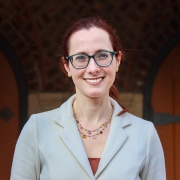Cooperation Emerges When Groups Are Small and Memories Are Long
In a new paper published in the journal Scientific Reports, Penn researchers use game theory to demonstrate the complex set of traits that can promote the evolution of cooperation. Their analysis showed that smaller groups in which actors had longer memories of their fellow group members’ actions were more likely to evolve cooperative strategies. The work suggests one possible advantage of the human’s powerful memory capacity: It has fed our ability as a society to cooperate.
“In the past we’ve looked at the interactions of two players to determine the most robust evolutionary strategies,” said Joshua Plotkin, a professor of biology. “Our new analysis allows for scenarios in which players can react to the behaviors and strategies of multiple other players at once. It gives us a picture of a much richer set of social interactions, a picture that is likely more representative of the complexities of human behavior.”
Plotkin collaborated with Alexander J. Stewart, then his postdoctoral researcher and now a Royal Society research fellow at University College London, on the work, which builds on years of game theory examinations by the pair.
Click here to read the full article.





